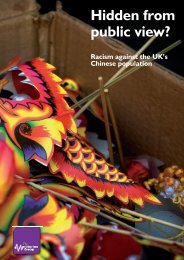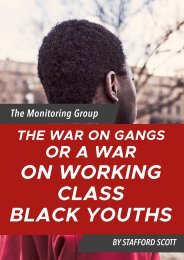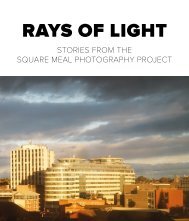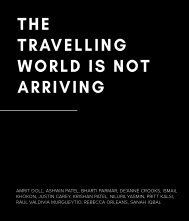Coming of Age : 1976 and the Road to Anti-Racism
Coming of Age : 1976 and the Road to Anti-Racism by Jagdish Patel and Suresh Grover
Coming of Age : 1976 and the Road to Anti-Racism
by Jagdish Patel and Suresh Grover
Create successful ePaper yourself
Turn your PDF publications into a flip-book with our unique Google optimized e-Paper software.
evisionist organisation, but also set up <strong>the</strong>ir own communist organisation in 1966 called <strong>the</strong><br />
Association <strong>of</strong> Indian Communists (AIC).<br />
The Sino-Soviet split was reflected in <strong>the</strong> CPGB with adherents <strong>and</strong> opponents <strong>of</strong> ‘<strong>the</strong><br />
British <strong>Road</strong> <strong>to</strong> Socialism’, <strong>the</strong> pro-Soviet analysis published by CPGB in 1951 recommending<br />
fighting for socialism within <strong>the</strong> democratic framework by working within <strong>the</strong> Labour Party<br />
<strong>and</strong> trade unions ra<strong>the</strong>r than waging a class war. A similar split was also reflected among AIC<br />
members in <strong>the</strong>ir attitude <strong>and</strong> actions not only in this country but also in India. IWA (Southall)<br />
was led by <strong>the</strong> AIC followers <strong>of</strong> <strong>the</strong> Soviet line. In 1971 <strong>the</strong>ir leader Vishnu Sharma became<br />
a member <strong>of</strong> <strong>the</strong> Executive Committee <strong>of</strong> <strong>the</strong> CPGB. In India <strong>the</strong>y supported <strong>the</strong> CPI (M). In<br />
contrast <strong>the</strong> IWA (GB) eschewed “entryism” (meaning infiltration in political organisations<br />
such as <strong>the</strong> Labour party <strong>and</strong> trade unions) in Britain <strong>and</strong> supported <strong>the</strong> CPI (ML).<br />
The IWA (Southall) <strong>and</strong> <strong>the</strong> IWA GB) also had different perspectives on race relations in<br />
Britain. The IWA (Southall) worked with government bodies whereas <strong>the</strong> IWA (GB) refused<br />
<strong>to</strong> become involved with state-sponsored organisations. The IWA (GB) claimed that <strong>the</strong> IWA<br />
(Southall) had an assimilationist philosophy <strong>and</strong> saw <strong>the</strong>ir role in educating Indians <strong>to</strong> make<br />
<strong>the</strong>mselves acceptable <strong>to</strong> British society. This was in contrast <strong>to</strong> <strong>the</strong> IWA (GB) which considered<br />
<strong>the</strong> problem <strong>to</strong> be racism, <strong>and</strong> saw <strong>the</strong>ir role as one <strong>of</strong> fighting racism <strong>and</strong> not <strong>of</strong> Anglicizing<br />
Indians. After <strong>the</strong> passing <strong>of</strong> race relations legislation in <strong>the</strong> mid-1960s <strong>the</strong>se differences<br />
had become more pronounced.<br />
I joined <strong>the</strong> IWA (GB) as a way <strong>of</strong> pursuing my revolutionary dreams without knowing<br />
about, leave alone joining, <strong>the</strong> Association <strong>of</strong> Indian Communists. Once Ranjana Ash left <strong>the</strong><br />
branch <strong>the</strong>re was no AIC member left but all <strong>the</strong> branch central committee members were<br />
sympa<strong>the</strong>tic <strong>to</strong> <strong>the</strong> Naxalite cause.<br />
Activities <strong>of</strong> <strong>the</strong> Central London Branch<br />
As Indian ‘communists’ in London we primarily involved ourselves with Indian workers’<br />
struggles in London which had two dimensions: fighting for rights at work <strong>and</strong> fighting<br />
against racism, The 1960s <strong>and</strong> 70s was a period <strong>of</strong> expansion <strong>of</strong> medium-sized manufacturing<br />
<strong>and</strong> engineering companies in West London. Many <strong>of</strong> <strong>the</strong>se hired recently arrived Indian<br />
migrants from Ug<strong>and</strong>a <strong>and</strong> Kenya as a source <strong>of</strong> cheap labour. (5) Struggles broke out<br />
all over <strong>the</strong> place for minimum wages, parity with white workers about wages <strong>and</strong> working<br />
conditions, proper work contracts, right <strong>to</strong> join trade unions <strong>and</strong> more. Strikes, walk-outs<br />
<strong>and</strong> o<strong>the</strong>r forms <strong>of</strong> struggle were commonplace. Among o<strong>the</strong>r things, we joined picket<br />
lines, distributed leaflets, sought support from o<strong>the</strong>r workers <strong>and</strong> from trade unions. The silk<br />
thread-making firm Perivale Gutterman’s strike in Perivale near Southall in 1973 <strong>and</strong> <strong>the</strong> strike<br />
at <strong>the</strong> film processing business run by Grunwick Processing Labora<strong>to</strong>ries Ltd in Willesden in<br />
<strong>Coming</strong> <strong>of</strong> <strong>Age</strong> | 151<br />
<strong>Coming</strong> <strong>of</strong> <strong>Age</strong> Final version 16.10.indd 151 17/10/2017 12:08







